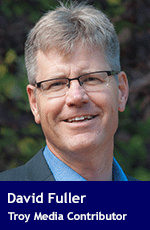True happiness comes from experiences, relationships, and a simple life – not money

For interview requests, click here
There’s a well-known story featuring a financial planner who, while on holiday in Mexico, encountered a fisherman sitting on a wharf. The man was strumming his guitar, his feet dangling over the water, clearly at ease.
“Is that your boat?” the planner asked.
“It is,” the fisherman replied.
The two struck up a conversation. The financial planner learned the man owned a single boat and was a skilled fisherman, having inherited his craft from generations before him.
“What do you do when you’re not fishing?” the planner asked.
 |
| Recommended |
| What Trudeau’s resignation teaches us about leadership
|
| Business traumatic stress disorder is real and devastating
|
| For entrepreneurs, a purpose statement is essential
|
“Oh, I sit here and play my guitar,” the fisherman said with a smile. “I play soccer with my kids on the beach, have a beer with my friends, and spend time with my wife.”
The planner saw an opportunity. “You’re already successful with one boat. Imagine if you had 10! You could hire workers to fish for you, make more money, and save for retirement. Then, when you’re older, you could relax here on the wharf, playing your guitar all day.”
The fisherman paused, then asked, “Let me get this straight. You want me to go into debt to buy more boats, manage employees who might not show up, make more money to give to you to invest – all so I can sit here and play my guitar, which is exactly what I’m doing now?”
This story reveals a hard truth: the relentless pursuit of wealth often blinds us to the value of simplicity and contentment. Our society equates success with material possessions, creating the illusion that happiness can be bought.
The monetization of happiness is deeply ingrained in our consumer culture. Banks offer easy credit, encouraging us to spend beyond our means. Marketers bombard us with images of luxury, feeding our desire for the latest gadgets, cars, and experiences. Even families sometimes push the next generation to climb the corporate ladder, assuming affluence will bring lasting satisfaction.
But the evidence tells a different story. Research consistently shows that happiness and money are only loosely connected. Once basic needs are met, additional income contributes less and less to overall happiness. While the specific amount may vary by individual and region, the principle remains the same: after a certain point, more money doesn’t necessarily bring more joy or life satisfaction.
Consider the happiest people you know. Are they the wealthiest? Probably not. In my experience, the most joyful individuals are those who focus on relationships, purpose, and simple pleasures. During my travels, I’ve met countless people like the fisherman – those who prioritize meaningful connections and invest in experiences over possessions.
Even in Canada, there are signs of change. I once heard about a law firm offering recruits less pay but more time off, recognizing that work-life balance often matters more than a higher salary. This is a small but encouraging step toward valuing time and well-being over financial gain.
So, how can we break this cycle of chasing affluence? It starts with shifting our priorities. Instead of accumulating possessions, we can focus on experiences – like spending time with loved ones, pursuing hobbies, or travelling. Studies show that investing in experiences brings greater satisfaction than buying material goods.
We also need to rethink how we define success. Is it really about a bigger house or a fancier car? Or is it about quality time with family, a sense of purpose, and contributing to our communities? At the end of the day, relationships – not things – are what bring us lasting joy.
Yes, money can buy comfort and opportunities, but it can’t buy peace of mind, purpose, or genuine happiness. When we focus too much on accumulating wealth, we risk losing sight of what really matters. Instead of falling into the trap of monetizing happiness, let’s learn from the fisherman: happiness often comes from life’s simplest joys – a laugh with friends, a game with your kids, or a quiet moment with a guitar.
David Fuller is a Commercial and Business Realtor with a strong reputation as an award-winning business coach and author. He has extensive experience helping businesses grow and succeed, providing guidance on various aspects of business management, strategy, and development. His work as a business coach and author has earned him recognition in the industry, making him a respected figure in both real estate and business coaching.
Explore more on Self-improvement, Your Money
Troy Media is committed to empowering Canadian community news outlets by providing independent, insightful analysis and commentary. Our mission is to support local media in building an informed and engaged public by delivering reliable content that strengthens community connections, enriches national conversations, and helps Canadians learn from and understand each other better.

